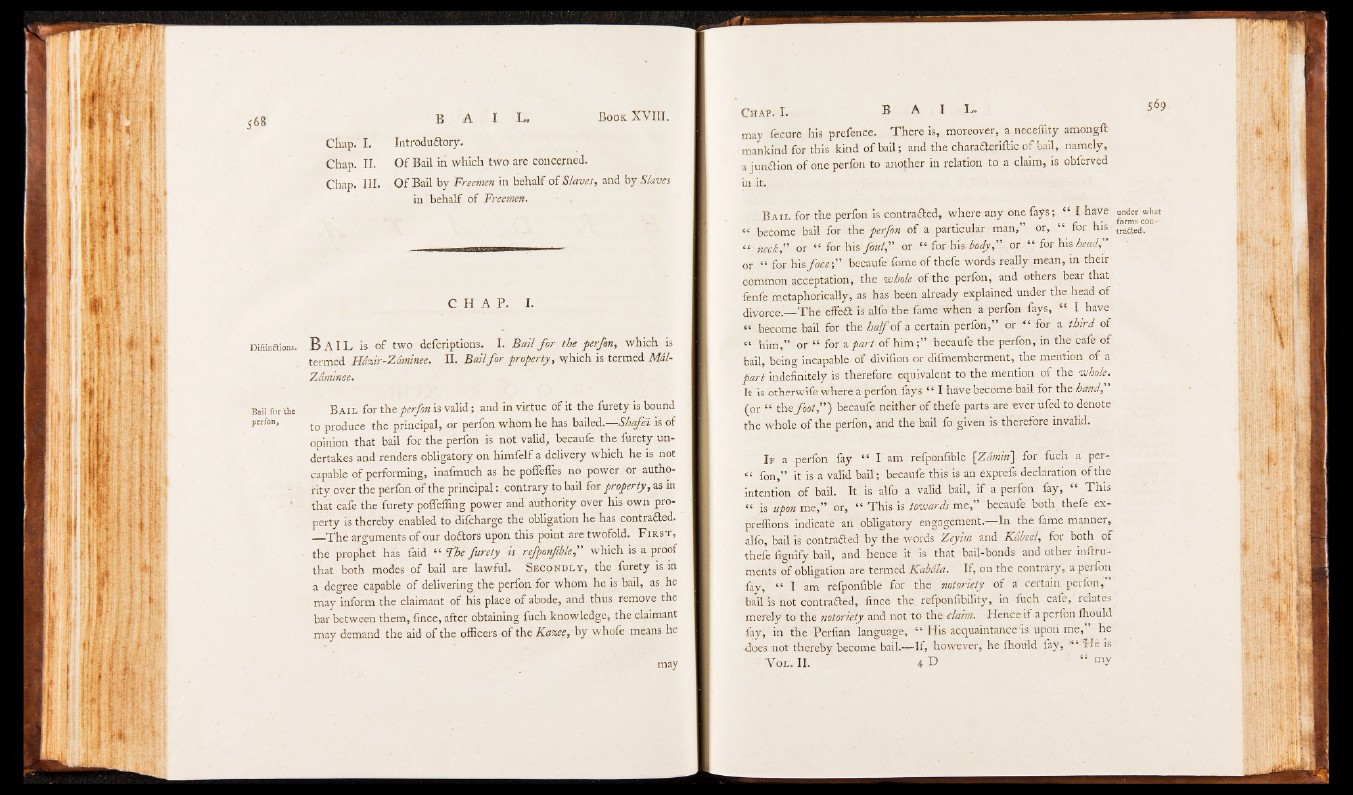
Chap. I. Introdu&ory.
Chap. II. O f Bail in which two are concerned.
Chap. III. O f Bail by Freetnen in behalf of Slaves, and by Slaves
in behalf of Freemen.
C H A P . I.
Diftin&ions. B a I L is of two defcriptions. I. B ail fo r the perfon, which is
termed Hdzir-Zdminee. II. Bailfor property, which is termed Mdl-
Zdminee.
Bail for the B a i l for the perfon is valid; and in virtue of it the furety is bound
Perf011' to produce the principal, or perfon whom he has bailed.— Shafei is of
opinion that bail for the perfon is not valid, becaufe the furety undertakes
and renders obligatory on himfelf a delivery which he is not
capable of performing, inafmuch as he poffeffes no power or authority
over the perfon of the principalcontrary to bail for property, as in
that cafe the furety poffeffing power and authority over his own property
is thereby enabled to difcharge the obligation he has contracted,
i— The arguments of our dodors upon this point are twofold. F i r s t ,
■ the prophet ha's faid “ The furety -is refponfible f which is a proof
that both modes of bail are lawful. S e c o n d l y , the furety is in
a degree capable of delivering the perfon for whom he is bail, as he
may inform the claimant of his place of abode, and thus remove the
bar between them, fince, after obtaining fuch knowledge, the claimant
may demand the aid of the officers of the Kuzee, by whofe means he
may
may fecure his prefence. There is,..moreover, a ueceffity amongft
mankind for this kind of bail; and the charaderiftic of bail, namely,
a jundion of one perfon to another in relation to a claim, is obferved
in it.
B a i l for the perfon is contracted, where any one fays; 1 1 have under what
“ become bail for the perfon of a particular man, or, tor niS' tra£te(1.
“ neck," or “ for his fou l," or “ Tor his body," or “ for his head,"
or “ for his fa ce;" becaufe fome of thefe words really mean, in their
common acceptation, the whole of the perfon, and others bear that
fenfe metaphorically, as has been already explained under the head o f
divorce.— The effed is alfo the fame when a perfon fays, “ I have
“ become bail for the h a lf of a certain perfon,” or “ for a third, of
“ him,” or “ for a part o f him;” becaufe the perfon, in the cafe of
bail, being incapable of divifion or difmemberment, the mention of a
part indefinitely is therefore equivalent to the mention of the whole.
It is otherwife where a perfon fays “ I have become bail for the hand,
(or “ thefoot,” ') becaufe neither o f thefe parts are "ever ufed to denote
the whole of the perfon, and the bail fo given is therefore invalid.
If a perfon fay “ I am refponfible \Zdmin\ for fuch a per-
“ fon,” it is a valid bail; becaufe this is an exprefs declaration o f the
intention of bail. It. is alfo a valid bail, if a perfon fay, “ This
“ ,is upon me,” or, “ This is towards me,” becaufe both thefe ex-
preffions indicate an obligatory engagement.— In the fame manner,
alfo, bail is contraded by the words Zeyirn and Kdbeel, for both of
thefe fignify bail, and hence it is that bail-bondlf and other mftru-
ments of obligation are termed Kabdla. If, on the conti ary, apeifon
fay, “ I am refponfible for the notoriety of a certain perfon,”
bail is not contracted, fince the. relponfibility, in fuch Cafe, relates
merely to the notoriety and not to the claim. Hence if a perfon Ihould
fay, in the Perfian language, “ His acquaintance Is upon me, he
■ doesmot thereby become bail.— If, however, he Ihould fay, *“ He is
V ol. II. 4 D “ my